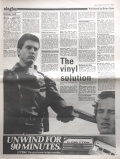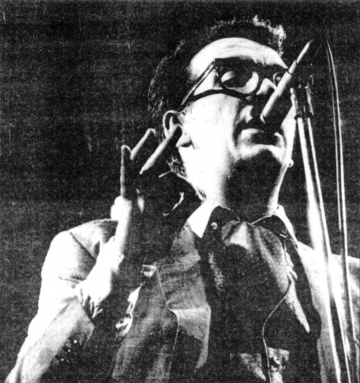Melody Maker, February 28, 1981: Difference between revisions
(+2nd twitter link) |
(add remainder of the transcribed text, remove Category:Transcription needed , add tags) |
||
| Line 23: | Line 23: | ||
<!-- CYNICAL --> | <!-- CYNICAL --> | ||
As in the songs of Costello's punk contemporaries and Lowe's " | As in the songs of Costello's punk contemporaries and Lowe's "Ugly Things," there is no sentimentality in this portrayal of "romance," only a cynical realisation of the true power-struggle which constitutes any relationship. (''"Somebody has to cry,"'' ''"You can't force me to use a little tenderness"''). | ||
Costello's aim is true and he realises that we would rather not face the truth, (''"anything but say that it's true"''). But despite "Less Than Zero" and the continual references to darkness, the album is not nihilistic. | Costello's aim is true and he realises that we would rather not face the truth, (''"anything but say that it's true"''). But despite "Less Than Zero" and the continual references to darkness, the album is not nihilistic. | ||
| Line 63: | Line 63: | ||
Costello, however, as an active member of the consumer society, must stand in an ambiguous relationship to the world of products. He himself produces records — a large feature of consumerism; the mechanical recording devices he damns are also his livelihood. | Costello, however, as an active member of the consumer society, must stand in an ambiguous relationship to the world of products. He himself produces records — a large feature of consumerism; the mechanical recording devices he damns are also his livelihood. | ||
''Armed Forces'' extends Costello's social vision. The individual is a victim, under suspicion, hounded and threatened by nameless investigating hives. (''"People you can check up on," "I want you checked", "She's picking out names," "You check her outline"''). Musically, "Party Girl" recalls "You Never Give Me Your Money," a song which includes the word "investigations." | |||
Many songs recall the urgent, melodramatic spy-themes of John Barry. The metaphors, drawn principally from military life (“Senior Service”, “Goon Squad”, “Oliver’s Army”) and the world of espionage, are used to explore the “emotional fascism: ‘romance’ has become a question of which individual will dominate the other: | |||
“Two little Hitlers will fight it out until/ One little Hitler does the other one’s will.” | |||
The inner sleeve shows a consumerist life of luxury (the swimming-pool of “In Every Dreamhome…”?): paint charts give glamorous names but all are actually the same colour: the TV announcer of “Green Shirt” can turn complex, multi-coloured issues “into black-and-white”. | |||
This black-and-white, money-dominated world is racialist: | |||
“Beat up strangers who talk funny/ Take their greasy foreign money”. | |||
The picture of Britain, gone “to the dogs and down the drains”, full of “busy bodies, getting nowhere” is bleak and hopeless. Despite his reiterated belief that “It’s the words that we don’t say that scare me so”, Costello no longer holds out the hope that speaking may solve social and individual problems. | |||
This is a world where people would rather not talk or listen; “I don’t want to hear it”; “You don’t want to hear about that”; “talk ‘till your face is blue”; so long as we don’t have to talk at all”. | |||
If there is talking or listening it has sinister, politically voyeuristic connotation – “listening in the Venus-line”, “just a word in Mr. Churchill’s ear”. Individuals have become “automatic”; the world of cosmetic consumerism has paralysed the ability to make real mental and moral decisions (“Your mouth is made up/ But your mind is undone”). Our obsession with appearance and with material objects prevents any real human contact: | |||
“You want to kiss her/ But she’s busy with her make-up.” | |||
Despite its commercial success, “Armed Forces” remains unsatisfactory. The complex, subtle verbal ironies of earlier albums have become heavy-handed, glib and simplistic (“Blame it all upon the darkies”). The amused disgust of “Red Shoes” becomes simply disgust (“you do the dirty business”, “Dirty words with dirty minds”). | |||
Costello’s great skill with puns and metaphors weakens (except on “Chemistry Class” and “Green Shirt”) and on this album deteriorates into simple tinkering with clichés which is at best “clever”, like 10CC, and at worst trite: | |||
“It’s a death that’s worse than fate”, “It’s all so calculated, She’s got a calculator”, “You’ll never be the guilty party girl”. | |||
Many songs | The light, tongue-in-cheek, Sixties-ish sound of earlier albums is replaced by a plush, thick production which does not underscore the songs’ ironies, but seems designed to gloss over their basic weakness. Many of the songs are “calculated”; by Costello’s standards, “second-rate”. | ||
In Autumn 1979 Costello began his involvement with The Specials, producing their first LP. Their first single, “Gangsters”, presents Costello’s world, where the individual is threatened by nameless forces, by mechanical gadgetry, by recording devices; and where he is threatened by the possibility of himself becoming a consumerist product, a bootleg LP – perhaps Costello’s greatest fear. The deep involvement with The Specials and the 2-Tone sound is obvious on “''Get Happy!!''” (especially “Opportunity”). | |||
Once again, Costello changes label to change musical style. In terms of lyrics, music, production and packaging the album represents a dramatic lowering of sights from the plushness of “''Armed Forces''”. (The cassette cover shows a low-brow eye-pencil). | |||
The sound is nostalgic (“There’ll never be days like that again”), often recalling the warm organ-based sounds of Booker T and Dylan’s “''Highway 61 Revisited''” or Motown’s driving vocals. The tone of Costello’s recent work is elegiac, full of a sense of loss. | |||
The violence of “Pump It Up” and “Lipstick Vogue” has mellowed. Though his social concern is still great – at its most powerful for those “Living a life that is almost like suicide” on “New Amsterdam” – “''Get Happy!!''” is not as dark in its vision as the two previous albums, for Costello rejects the role of doom-prophet he formerly assumed. | |||
<!-- SOCIAL--> | |||
His re-established position as unassuming social commentator recalls the stances of The Specials and of songwriters of the Sixties. Costello re-explores, in the style and format of the Sixties, the relationship between love and money which has led to the emotional bankruptcy of our society (especially recalling Beatles’ songs which investigate this relationship; “Possession” opens with the opening line of “From Me To You”). | |||
Love and money are inextricably interwoven (“Is it pleasure or business?”). This relationship is expressed through some classic Costello revitalisations of metaphor: “he’d never seen love so dear”, “I’ll pay you a compliment”. | |||
Economic possession means emotional possession. Children are born as a result of financial inducement (“Big money for families having more than one”). Costello’s ability to rework metaphors and puns to express human relationships and to use a phrase with multiple meanings (“Love For Tender”) is still evident. | |||
The disgust of “''Armed Forces''” disappears, and the amusement of “Red Shoes” returns. “King Horse” reminds us what a wry, sardonic humorist – like Ray Davies – Costello can be. However, it seems part of Costello’s recent strategy that words should become less important (as on “Moods For Moderns”). | |||
His suspicion of words increases: “Everything you say now sounds like it was ghost-written”. In a world where “Money talks, and it’s persuasive”, it is perhaps better to remain silent. Speaking seems only imply commercial values – “You can put your money where your mouth it”. Silence presents sinister threats (“the violence/or the tears or the silence”) but the alternative may be to “just talk and talk” “stupid nonsense”. | |||
A girl in “I’m Not Angry” was “talking with her hands … smiling with her legs”. Costello now seems to believe that expressions on faces (“it’s newsprint all over your face”, “Clack of the faces”) and actions of the body, may speak louder than words: | |||
“Your body speaks so much louder than your voice/ You let it do the talking.” | |||
Compare “Ghost Train”;: “Look at the graceful way she dances/ One foot speaks, the other answers.” | |||
Through dancing, our bodies speak most eloquently. In keeping with this “''Get Happy!!''” – with its debts to ska, bluebeat, R ‘&’ B – works not only on the level of listenable lyrics but also on the level of danceable music; not simply a consumerist product, but performing a social function. | |||
Costello has returned to a rougher rawer production and mix (the “live” sound of The Specials’ LP), in an effort to escape from himself becoming a consumer product – a situation strongly threatened by “''Armed Forces''”. | |||
Costello has acknowledged that he is part of the consumer society, making commercial products. He has options: to settle happily into that society; or increasingly to opt out of the fate of himself becoming a product; to become a producer of other people’s work. | |||
Costello has been influential in re-establishing many of the features of Sixties pop music: the short, energetic two-minute single; the album of 12 (or 20!) songs; the sounds of a Sixties dance band. His great contributions have been his cynical, sceptical but seriously truthful picture of “romance” – the harsh reality of what it means to be “in love”; and his presentation of the emotional failure, the jilted, ironic observer as hero (an obvious influence on Joe Jackson). | |||
However, Costello has found that it is increasingly difficult to maintain convincingly the role of failure when you are a rock superstar. His debts to punk music have been great but, unlike many punk writers, he has always played off his ironic sardonic lyrics against strong melody lines, rarely compromising the validity of the lyrics by this contrast, (Blondie take note). | |||
He has helped to establish 2-Tone, one of the most successful and innovative labels of recent times. His songs are serious but not grave; his view of our society is essentially moralistic but, except for the aberrations of “Armed Forces”, he does not seek to preach, only to comment. His work and influence have been of lasting importance. | |||
{{cx}} | |||
{{tags}}[[ Flip City]] {{-}} [[My Aim Is True]] {{-}} [[Nick Lowe]] {{-}} [[The Ugly Things]] {{-}} [[(The Angels Wanna Wear My) Red Shoes]] {{-}} [[Elvis Presley]] {{-}} [[Mystery Dance]] {{-}} [[No Dancing]] {{-}} [[Sneaky Feelings]] {{-}} [[Watching The Detectives]] {{-}} [[This Year's Model]] {{-}} [[Stiff]] {{-}} [[Radar]] {{-}} [[Living In Paradise]] {{-}} [[You Belong To Me]] {{-}} [[I'm Not Angry]] {{-}} [[Hand In Hand]] {{-}} [[My Funny Valentine]] {{-}} [[Girls Talk]] {{-}} [[Lipstick Vogue]] {{-}} [[Watching The Detectives]] {{-}} [[Living In Paradise]] {{-}} [[Radio, Radio]] {{-}} [[Armed Forces]] {{-}} [[Party Girl]] {{-}} [[Senior Service]] {{-}} [[Goon Squad]] {{-}} [[Oliver's Army]] {{-}} [[Green Shirt]] {{-}} [[Chemistry Class]] {{-}} [[The Specials]] {{-}} [[The Specials: Specials|Specials]] {{-}} [[Gangsters]] {{-}} [[2 Tone]] {{-}} [[Get Happy!!]] {{-}} [[Opportunity]] {{-}} [[Booker T. Jones|Booker T]] {{-}} [[Bob Dylan]] {{-}} [[Pump It Up]] {{-}} [[New Amsterdam]] {{-}} [[The Beatles]] {{-}} [[Possession]] {{-}} [[King Horse]] {{-}} [[Ray Davies]] {{-}} [[Moods For Moderns]] {{-}} [[Ghost Train]] {{-}} [[Blondie]] | |||
{{cx}} | |||
{{Bibliography notes header}} | {{Bibliography notes header}} | ||
| Line 142: | Line 180: | ||
[[Category:Magazine articles]] | [[Category:Magazine articles]] | ||
[[Category:Single reviews]] | [[Category:Single reviews]] | ||
Revision as of 20:20, 28 May 2020
|



